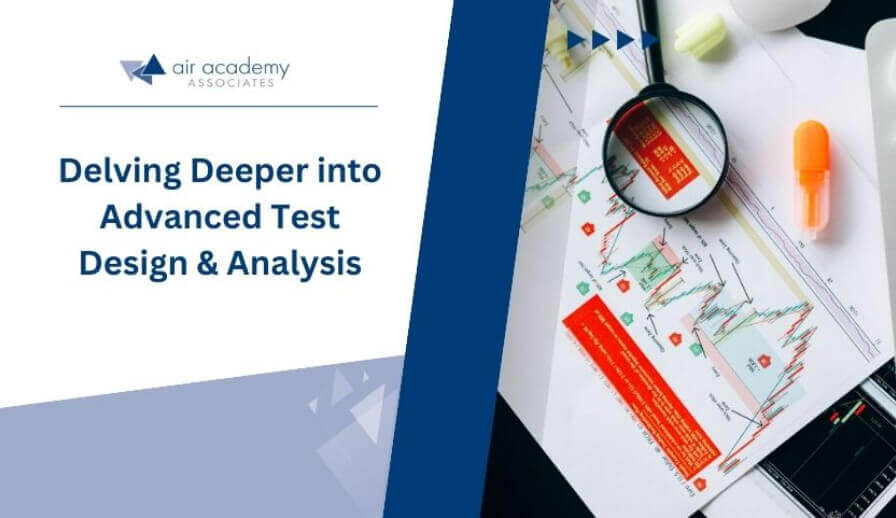
Data is more than just numbers; it’s the backbone of innovation and decision-making. With industries pivoting towards a data-centric approach, there’s a growing demand for professionals who can interpret data and derive meaningful insights from it.
Recognizing this trend, Air Academy Associates has crafted a course beyond the basics. The course simplifies intricate concepts by integrating the principles of their signature Keep-It-Simple-Statistically (KISS) methodology, making them relatable and actionable for participants.
Key Takeaways
- Data analysis is foundational to innovation and decision-making, necessitating a course that goes beyond basics to equip professionals with the ability to interpret and derive insights from data.
- The Advanced Test Design and Data Analysis course, structured to be self-paced, integrates Air Academy Associates‘ Keep-It-Simple-Statistically (KISS) methodology to simplify complex concepts, offering a holistic understanding through 14 recorded sessions.
- Participants will gain critical thinking skills, advanced measurement techniques, and the ability to apply traditional and modern analytical methods to real-world scenarios, enhancing their data-driven decision-making and problem-solving abilities.
- The course provides a comprehensive learning experience with its blend of theory and practical applications. It also offers professional recognition and a pathway to advanced certifications, preparing participants for leadership roles in data analysis projects across various industries.
Course Structure
Overview
The Advanced Test Design and Data Analysis course is designed to be self-paced, allowing participants the flexibility to learn at their rhythm. Comprising 14 meticulously crafted recorded sessions, the course ensures a holistic understanding of the subject matter.

Image Source: Freepik
Session Breakdown
Introduction to Critical Thinking
This session lays the foundation by emphasizing the importance of analytical and logical reasoning in data analysis.
Participants will learn to question assumptions, evaluate arguments, and distinguish between relevant and irrelevant information. This session equips learners with the mindset needed to approach data critically, forming the basis for more advanced analytical techniques explored in subsequent sessions.
Advanced Measurement System Analysis (MSA) Techniques
Building on critical thinking skills, this session dives into the complexities of MSA, highlighting its importance in ensuring the quality and reliability of data. Participants will be introduced to advanced MSA methodologies such as gauge R&R studies, bias, linearity, and stability analyses. The session aims to equip learners to assess and improve measurement systems, a fundamental skill, before proceeding to hypothesis testing and data modeling.
Advanced Hypothesis Testing
With a solid understanding of data quality from the MSA session, participants will now explore sophisticated techniques in hypothesis testing. This includes learning about various tests (e.g., t-tests, ANOVA, chi-square tests) and how to apply them in different contexts to ensure data integrity and accuracy.
The session emphasizes understanding when and how to use each test, interpreting results, and making informed decisions based on statistical evidence.
Describing Data with Distributions
This session focuses on statistical distributions and their significance in predictive analytics. Learners will discover how to identify the appropriate distribution model for a data set and use it to make predictions about future data points. Skills taught include fitting data to normal, binomial, Poisson, and other distributions, assessing the goodness of fit, and understanding the implications of distribution choice on data analysis outcomes.
Logistic Regression
Expanding on the predictive analytics theme, this session explores logistic regression, a powerful tool for modeling binary outcomes. Participants will learn how to develop logistic regression models, interpret the coefficients, and predict the probability of outcomes based on categorical independent variables. This session is crucial for learners aiming to apply data analysis in fields where decisions are made based on categorical data predictions.
Screening Designs
As learners progress to experimental design, this session introduces screening designs, a method to identify the most significant factors affecting a process or system. The focus will be on designing and analyzing screening experiments to narrow the list of potential factors for further investigation efficiently. Skills covered include selecting appropriate design types, conducting experiments, and analyzing results to prioritize factors.
Modeling Designs
This advanced session delves into developing models replicating real-world phenomena and predicting future outcomes. Participants will learn about different modeling design techniques, including factorial designs, response surface methodology, and robust design. The session aims to equip learners to create accurate, predictive models that account for variability and optimize processes.
| Component | Key Points | Examples |
| Critical Thinking | Questioning data context, identifying patterns, anomalies, considering variability and outliers. | Evaluating patient recovery times to identify effective treatments. |
| Comprehensive Coverage | DOE applications in optimizing processes, understanding effects of input factors on outputs. | Optimizing manufacturing conditions using DOE to improve product quality. |
| Traditional and Advanced Techniques | Combining foundational statistical tools with advanced methodologies like machine learning for predictive modeling. | Predicting customer churn using logistic regression, developing retention strategies. |
| Real-world Applications | Practical examples like regression modeling for pass/fail outcomes, dealing with imbalanced datasets. | Using oversampling techniques to improve model performance in product testing. |
| Course Affiliations | Recognition for advanced analytical capabilities, application in projects like reducing manufacturing defects. | DFSS Black Belt projects applying robust design principles in automotive manufacturing. |
| Course Approach | Simplifying complex concepts like multivariate analysis, making statistical jargon accessible. | Teaching multivariate analysis step-by-step, improving decision-making. |
Learning Objectives
Focus on Critical Thinking
Critical thinking in data analysis is about observing data and questioning the context, the collection process, and the underlying assumptions.
For instance, when examining a dataset of patient recovery times from a new treatment, critical thinking involves looking at the average recovery time and considering the variability in recovery times, outliers that may indicate complications, or subgroups that respond differently to the treatment. This nuanced analysis enables practitioners to identify patterns and anomalies beyond surface-level insights, leading to more personalized and effective healthcare strategies.

Image Source: Freepik
Comprehensive Coverage
he Advanced Test Design and Data Analysis course offers an immersive exploration into experimental design and data analysis techniques. A practical example of this comprehensive coverage is the application of Design of Experiments (DOE) in optimizing a manufacturing process.
Learners can identify the optimal manufacturing conditions by systematically varying input factors, such as temperature and pressure, and observing their effect on the output quality. This builds a strong foundation in DOE principles and equips professionals with the ability to enhance efficiency and product quality in their industries.
Traditional and Advanced Techniques
While foundational statistical tools, such as t-tests or ANOVA, are crucial for basic data analysis, the course also delves into advanced methodologies like machine learning algorithms for predictive modeling.
For example, using logistic regression to predict customer churn based on historical data involves statistical analysis and understanding how to interpret and apply these predictions to develop retention strategies, showcasing how traditional and advanced techniques combine to solve complex business challenges.
Real-world Applications
Discussing real-world challenges brings theory into practice. Consider using regression modeling to predict pass/fail outcomes for a series of product tests. This involves running the regression and understanding how to deal with imbalanced datasets where failures are rare. Implementing techniques such as oversampling or specialized loss functions can improve model performance, demonstrating the course’s focus on practical, applicable solutions.

Course Affiliations
Being part of the Test Design and Analysis Professional curriculum and offering an option for DFSS Black Belt certification means participants are recognized for their advanced analytical capabilities.
For example, a DFSS Black Belt might lead a project to reduce defects in automotive manufacturing by applying robust design principles learned in the course, showcasing the real-world value and credibility of these affiliations.
Course Approach
The KISS (Keep-It-Simple-Statistically) approach is exemplified by teaching complex concepts like multivariate analysis in a user-friendly manner. By breaking down the process into manageable steps—such as understanding the purpose of the analysis, preparing the data, selecting the suitable model, and interpreting the results—learners can grasp and apply these techniques without getting overwhelmed by statistical jargon.
This approach ensures that participants can make informed decisions based on a sound understanding of data collection and analysis techniques.
The Advanced Test Design and Data Analysis course is more than just a series of sessions. It’s a journey that transforms participants, equipping them with the skills to navigate the complex world of data analysis confidently. Whether it understands the nuances of hypothesis testing or the intricacies of robust design, this course ensures that participants emerge as well-rounded professionals ready to tackle any analytical challenge.
What’s Included in the Course
Online Modules
The digital age demands flexibility, and this course delivers just that. Participants get access to all online modules, allowing them to learn at their convenience. Whether you’re a morning person who loves to learn with the sunrise or a night owl who finds peace in the quiet of the night, these modules are available 24/7.
Downloadable Content
Learning isn’t just about listening and watching; it’s about doing. The course offers downloadable PDF versions of the modules, ensuring participants can refer to them offline.
Additionally, data files are available for download, allowing hands-on practice using software to reinforce the concepts learned

Image Source: Freepik
Additional Resources
Knowledge is vast, and sometimes, external resources can provide added insights. Participants receive an e-version of “Design for Six Sigma: A Tools Guide for Practitioners.” This guide is valuable, complementing the course content and offering deeper dives into specific topics.
Personalized Assistance
Every individual is unique, and so are their queries. Recognizing this, the course offers up to 2 hours of one-on-one time with an Air Academy MBB (Master Black Belt). This personalized assistance ensures that participants can clarify doubts, discuss concepts in-depth, and get expert insights tailored to their needs.
Certification Details
The journey doesn’t end with the completion of the modules. Participants undergo an online exam to test their understanding. But that’s not all. The course also includes a project/studies review, ensuring participants can apply their learnings in real-world scenarios. Completing these steps leads to certification, a testament to the participant’s advanced test design and data analysis expertise.
Learning Outcomes of Advanced Test Design & Data Analysis
The Advanced Test Design and Data Analysis course is structured to endow participants with a deep understanding and practical skills that are pivotal in business and research. This section elaborates on the specific outcomes participants can expect upon completing the course, focusing on the types of decisions, analyses, and strategic insights they will be equipped to undertake.

Image Source: Freepik
Enhanced Decision-Making Abilities
Participants can make data-driven decisions by applying advanced statistical analysis and test design principles. This encompasses:
- Critical Evaluation of Data: Ability to critically assess the quality and relevance of data, ensuring decisions are based on solid, reliable information.
- Complex Problem Solving: Skills to dissect complex problems into manageable parts, apply appropriate statistical tests, and interpret the results to guide decision-making processes.
Advanced Analytical Skills
The course equips learners with the capability to conduct sophisticated analyses, enabling them to:
- Design and Analyze Complex Experiments: Mastery over designing experiments that efficiently test hypotheses and analyze the results to draw meaningful conclusions. This includes understanding factorial designs, response surface methodology, and optimization techniques.
- Predictive Analytics and Modeling: Proficiency in using logistic regression and other predictive models to forecast outcomes and inform strategic planning. Participants will learn to build models to predict future trends, customer behavior, or potential risks.
Strategic Insight and Impact
Upon completion, participants will be able to leverage their analytical skills to provide strategic insights, contributing significantly to business or research outcomes:
- Informing Business Strategy: The ability to use data analysis to identify market trends, customer needs, and potential areas for innovation, shaping effective business strategies.
- Enhancing Research and Development: Skills to design and execute rigorous experiments in research settings, accelerating the development of new products or the improvement of existing ones.
- Optimizing Processes: Competence in applying data analysis to process improvement, enhancing efficiency, reducing costs, and increasing profitability.
Real-World Application
The course emphasizes the real-world applicability of skills learned, preparing participants to:
- Tackle Industry-Specific Challenges: Whether in healthcare, finance, manufacturing, or technology, participants can address sector-specific analytical challenges.
- Lead Data-Driven Projects: Equipped with advanced test design and analysis skills, course graduates will be capable of leading projects requiring deep data analysis from inception to conclusion.
Takeaway
In an era where data is often termed the ‘new oil,’ the ability to analyze, understand, and derive meaningful insights from this data is paramount. The Advanced Test Design and Data Analysis course by Air Academy Associates is meticulously crafted to meet this need. It’s not just about understanding statistical concepts; it’s about applying them to real-world challenges, making informed decisions, and driving organizational growth.
The course’s comprehensive structure, combined with its practical approach, ensures that participants are well-equipped to navigate the complexities of the modern data landscape. Whether you’re a professional looking to upskill, a student aiming to get a head start in your career, or an organization looking to train your workforce, this course is the perfect fit.
The course offers unparalleled value with its blend of traditional and advanced techniques, personalized assistance, and many resources. But beyond the modules, resources, and certifications, the transformation participants undergo stands out. From being data novices, participants emerge as data champions, ready to harness the power of data for strategic decision-making.
The Advanced Test Design and Data Analysis course is more than just an educational program; it’s a transformation journey. A journey that empowers individuals fuels organizational growth and paves the way for a data-driven future. Don’t miss out on this opportunity to participate in this transformative journey. Enroll today and take the first step towards becoming a data maestro!


